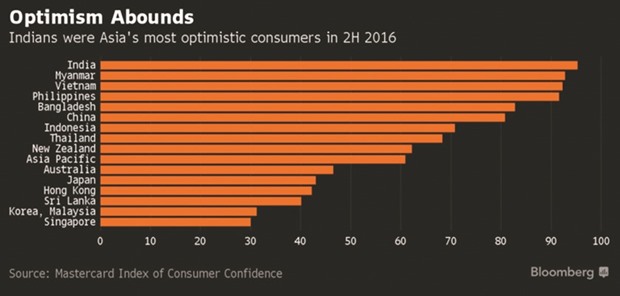Prime Minister Narendra Modi has something to cheer about even as economists slash India’s growth forecasts.
A clutch of studies and surveys published around the World Economic Forum show that perceptions about India’s outlook are improving, closing the gap with China. The results will be heartening for Modi, who’s under fire at home for his shock currency withdrawal that’s left analysts scrambling to calculate the impact on the $2tn economy.
Forecasts and perceptions will play a role as Modi nears several state elections scheduled to start next month. His administration is also due
to present its annual budget on February 1.
ECONOMIC OUTLOOK
The cash clampdown will hurt India in the near term, though growth will rebound, according to the International Monetary Fund. It cut its forecast for India’s gross domestic product to 6.6% from 7.6%. “Even with our downgrade, India’s growth rate remains substantial,” said Maury Obstfeld, the IMF’s research director. “We do agree with the general goal that motivated this, which is reducing the extent of illicit transactions in the economy.”
BUSINESS PROSPECTS
While global chief executives are less interested in India than they were in 2011 – “perhaps because structural reforms have been slow to come” – local business leaders are more optimistic about prospects in the South Asian nation. PWC surveyed almost 1,400 CEOs across 79 countries.
BULGING MARKET
Much of this confidence can be attributed to consumption, crimped by Modi’s cash ban but still the highest in Asia. Consumer sentiments, which slipped 2.4 points in June-December from the first half of 2016, stays in “extremely optimistic” territory in Mastercard’s survey.
NIMBLE POLICIES
Credit must also be given to policy makers, whose responses to political and economic risk are seen as most likely to help business prospects. About 20% of respondents in the Economist’s survey felt their firm’s expectations were “overly optimistic” for China. The same proportion believed that corporate expectations were too low for India.
EFFECTIVE INSTITUTIONS
That sentiment is also echoed among citizens. Edelman assessed institutional trust by surveying more than 33,000 people in 28 countries between October 12 and November 16. ‘Informed public’ refers to college-educated people aged 25-64, who’re in the top 25% of household income in their countries and who report significant media consumption.
ATTRACTING FOREIGNERS
While India doesn’t figure among the most sought after global destinations for expatriates, foreigners in India are more confident about their prospects than in many other Asian countries, an HSBC report shows. A majority of expats in India say that living here has accelerated their progress toward long-term savings and investments. Modi last year allowed foreigners who invest at least $1.5mn in India and create 20 jobs to qualify for Indian residency.
LINGERING WORRY
The biggest concern – for Modi and his citizens – will be the onward march of the robots. Over a quarter of employers in India say that automation will kill jobs over the next two years, according to a report from ManpowerGroup, which surveyed 18,000 employers in 43 countries. Job additions at Tata Consultancy Services Ltd and Infosys Ltd in the last three months of 2016 were the smallest in at least six quarters, a byproduct of Asia’s largest software exporters moving toward robotics and other less employment-intensive areas.

